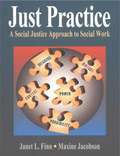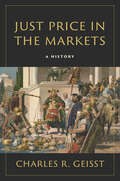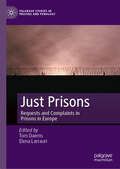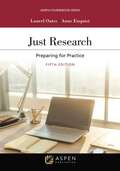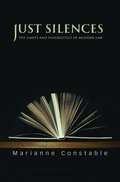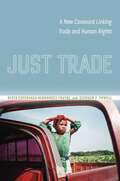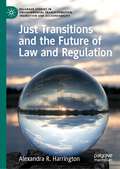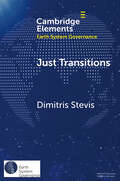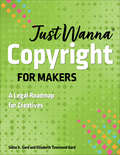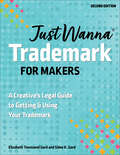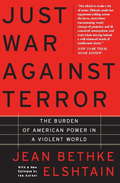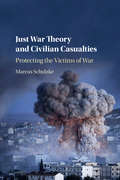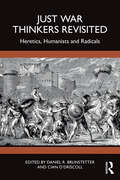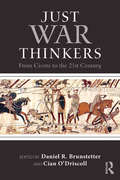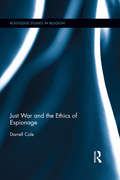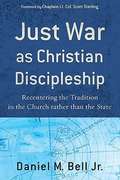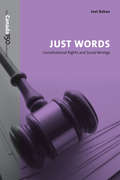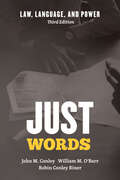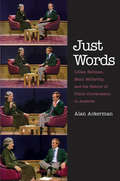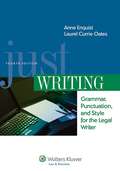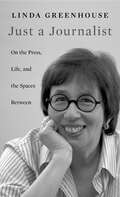- Table View
- List View
Just Practice: A Social Justice Approach to Social Work
by Janet L. Finn Maxine JacobsonSocial work in the 21st century calls for new ways of thinking and acting in order to address these challenges and realize our professional commitment to social justice.
Just Price in the Markets: A History
by Charles R. GeisstA concise history of “just price,” from Aristotle to the present day The question of what constitutes a fair price has been at the center of market interactions since the time of Aristotle. Should a seller sell to the highest bidder, or is there some other standard, such as a morally defined price, to be applied? Charles R. Geisst traces the ways that philosophers, religious leaders, and economists have sought to answer that question, from antiquity through the modern era. Aristotle’s thinking on usury influenced the idea of pricing well into the Renaissance. In his view, money was barren and should not be used to beget more money. As trade became more extensive, the strictures placed on pricing by Aristotelian thinking began to fall away, replaced by Roman and common-law conceptions of value and interest. Geisst’s book follows the evolution of that thought—influenced along the way by figures such as Copernicus, Fibonacci, Adam Smith, Marx, Cassel, and Keynes—and charts parallel developments in European and Islamic notions of fair pricing. Today, pricing is seen as an economic inevitability, dictated by the laws of supply and demand. But this has not always been the case. As Geisst argues, the idea of a just price was once a moral concept, long before it was an economic one.
Just Prisons: Requests and Complaints in Prisons in Europe (Palgrave Studies in Prisons and Penology)
by Tom Daems Elena LarrauriThis edited book explores how requests and complaints by prisoners are being dealt with by prison governors/administrations or independent bodies (such as complaint commissions), in different parts of Europe. It asks who complains and why? How are complaints from prisoners being dealt with, from a legal and empirical point of view? How do procedures work and can they be considered effective? Should administrative procedures be exhausted before appealing to a judge? It explores whether such systems comply with international regulation, such as the European Prison Rules, the UN Mandela Rules or the case-law of the ECtHR. It speaks to academics, NGOs and lawyers with an interest in prison law, human rights bodies and prison monitoring bodies.
Just Research: Preparing For Practice (Aspen Coursebook Ser.)
by Anne Enquist Laurel Currie OatesJust Research provides students with the information and skills that will enable them to do thorough and cost-effective research as soon as they enter into practice. Highly respected authors Laurel Currie Oates and Anne Enquist describe the sources that can be used to research the most common types of legal issues, for example, issues governed by state statutes and regulations, issues governed by federal statutes and regulations, issues governed by local law, and issued governed by common law.
Just Satisfaction under the European Convention on Human Rights
by Octavian IchimHow effective is the European Court of Human Rights in dispensing justice? With over 17,000 judgments handed down, it is undoubtedly the most prolific international court but is it the most efficient when compensating the victims of a violation? This crucial but often overlooked question is the focus of this important new monograph which gives a clear, comprehensive and convincing demonstration of the negative impact, in terms of unpredictability and legal uncertainty, of the discretion used by the Court when it comes to the regime of reparation. It reveals the adverse influence of such a high discretion on the quality of its rulings - ultimately on the coherence of the system and on the Court's authority, and makes suggestions for improvement.
Just Silences: The Limits and Possibilities of Modern Law
by Marianne ConstableIs the Miranda warning, which lets an accused know of the right to remain silent, more about procedural fairness or about the conventions of speech acts and silences? Do U.S. laws about Native Americans violate the preferred or traditional "silence" of the peoples whose religions and languages they aim to "protect" and "preserve"? In Just Silences, Marianne Constable draws on such examples to explore what is at stake in modern law: a potentially new silence as to justice. Grounding her claims about modern law in rhetorical analyses of U.S. law and legal texts and locating those claims within the tradition of Nietzsche, Heidegger, and Foucault, Constable asks what we are to make of silences in modern law and justice. She shows how what she calls "sociolegal positivism" is more important than the natural law/positive law distinction for understanding modern law. Modern law is a social and sociological phenomenon, whose instrumental, power-oriented, sometimes violent nature raises serious doubts about the continued possibility of justice. She shows how particular views of language and speech are implicated in such law. But law--like language--has not always been positivist, empirical, or sociological, nor need it be. Constable examines possibilities of silence and proposes an alternative understanding of law--one that emerges in the calling, however silently, of words to justice. Profoundly insightful and fluently written, Just Silences suggests that justice today lies precariously in the silences of modern positive law.
Just Trade: A New Covenant Linking Trade and Human Rights
by Berta Esperanza Hernández-Truyol Stephen Joseph PowellDocuments Annex: http://www.nyupress.org/justtradeannex/index.htmlIt is generally assumed that pro-trade laws are not good for human rights, and legislation that protects human rights hampers vibrant international trade. In a bold departure from this canon, Just Trade makes a case for reaching a middleground between these two fields, acknowledging their coexistence and the significant points at which they overlap. Using actual examples from many of the thirty-five nations of the Western Hemisphere, the authors—one a human rights scholar and the other a trade law expert—carefully combine their knowledge to examine human rights policiesthroughout the world, never overlooking the very real human rights problems that arise from international trade. However, instead of viewing the two kinds of law as isolated, polar, and sometimes hostile opposites, Berta Esperanza Hernández-Truyol and Stephen J. Powell make powerful suggestions for how these intersections may be navigated to promote an international marketplace that embraces both liberal trade andliberal protection of human rights.
Just Transitions and the Future of Law and Regulation (Palgrave Studies in Environmental Transformation, Transition and Accountability)
by Alexandra R. HarringtonThis book provides a comprehensive assessment of how national and international efforts to achieve carbon neutrality have been embraced as necessary to meet the requirements of the Paris Agreement as well as the needs of the planet. The authors explore the increasing tensions between aspirations and entrenched practices as methods to implement carbon neutrality are devised, particularly at the national and sub-national levels. This is perhaps best typified by efforts to shift from “dirty” energy production, such as coal, to greener alternatives, which are often supported in laws and rules but opposed by society. To bridge this void, the concept of just transitions has increasingly come to the forefront of international and national focus yet is often poorly understood. This book examines the ways in which just transitions have been proposed as a legal and regulatory bridge to address issues that result in societal resistance to implementation. It uses past and existing practice studies of just transitions before providing an analysis of how just transitions can be used to not only to assist in the shift to carbon neutrality but also in new shifts such as those caused by the Covid-19 pandemic impacts on economy, environment and society, and to address future global challenges.
Just Transitions: Promise and Contestation (Elements in Earth System Governance)
by Dimitris StevisJust transition prompts us to explore a number of important dimensions of Earth System Governance research, including sustainability transformations, inequality, power and justice. This Element aims to place just transition in the dynamics of the world political economy over the last several decades and to offer an overview of the varieties of just transitions based on an analytical scheme that focuses on their breadth (coverage), depth (social and ecological priorities) and ambition. The focus on breadth, depth and ambition centers on power, inequality and injustice and allows us to analyze and compare just transitions as a prerequisite for their fuller interpretation.
Just Wanna Copyright for Makers: A Legal Roadmap for Creatives
by Elizabeth Townsend Gard Sidne K. GardCreatives, it's time to obtain those copyrights! Violating copyright laws can result in significant financial consequences and potentially threaten your business's success. Just Wanna Copyright for Makers: A Legal Roadmap for Creators offers artists, crafters, and creative entrepreneurs a concrete understanding to navigate the copyright system. Learn how to enforce your copyrights, protect your creations, and defend your artistic choices. From enforcing copyrights to navigating the legalities of your craft, this guide is your ticket to a thriving creative business. Avoid common legal pitfalls and confidently make money! Explore legal information tailored for creatives, complete with accessible language and easy-to-grasp examples to help proceed with confidence Receive expert information to help protect your work and sidestep potential legal pitfalls with insights from professionals who specialize in safeguarding artistic work Learn real-world examples from crafters, quilters, and creative entrepreneurs
Just Wanna Trademark for Makers: A Creative's Legal Guide to Getting & Using Your Trademark
by Elizabeth Townsend Gard Sidne K. GardCreative entrepreneurs and professionals—learn how to boost your chances for securing trademarks for a wide range of arts and crafts. Securing a trademark can be complicated, time-consuming, costly, and all too often unsuccessful. The resources currently on the market are not aimed at creative professionals, leaving them guessing at critical information or wrangling with examples without relatable context. Just Wanna Trademark for Makers offers easy-to-understand legal information created specifically for creative entrepreneurs and professionals. Going beyond the quilt-focused first edition, this newly revised book has updated information, new examples, and cases that show all creative entrepreneurs how to navigate the process of securing a trademark. · Made for makers—All the legal advice is broken down with clear examples so you can proceed confidently · Get expert advice to protect your work and avoid legal pitfalls from experts that understand the art and craft world Learn from real-world examples represented by a wide range of arts and crafts, including quilting, candle making, cosplay, writing, woodworking, and much more
Just War Against Terror: The Burden Of American Power In A Violent World
by Jean ElshtainJean Bethke Elshtain advocates "just war" in times of crisis and mounts a reasoned attack against the anti-war contingent in American intellectual life. Advocating an ethic of responsibility, Elshtain forces us to ask tough questions not only about the nature of terrorism, but about ourselves. This paperback edition features a new introduction by the author, addressing the Iraq war and other events in the Middle East.
Just War Against Terror: The Burden of American Power in a Violent World
by Jean Bethke ElshtainAnalysis of the demands arising from the terror of 9-11.
Just War Theory and Civilian Casualties: Protecting the Victims of War
by Marcus SchulzkeThere are strong moral and legal pressures against harming civilians in times of conflict, yet neither just war theory nor international law is clear about what responsibilities belligerents have to correct harm once it has been inflicted. In this book, Marcus Schulzke argues that military powers have a duty to provide assistance to the civilians they attack during wars, and that this duty is entailed by civilians' right to life. Schulzke develops new just war principles requiring belligerents to provide medical treatment and financial compensation to civilian victims, and then shows how these principles can be implemented in governmental, military, and international practice. He calls for a more individual-focused conception of international law and post-war justice for victims - as opposed to current state- or group-based reconstruction and reparation programs - which will provide a framework for protecting civilian rights.
Just War Thinkers Revisited: Heretics, Humanists and Radicals (War, Conflict and Ethics)
by Daniel R. Brunstetter Cian O’DriscollThis book comprises essays that focus on a range of thinkers who challenge the boundaries of the just war tradition.The ethics of war scholarship has become a rigid and highly disciplined activity, closely associated with a very particular canon of thinkers. This volume moves beyond this by presenting thinkers not typically regarded as part of that canon but who have interesting and potentially important things to say about the ethics of war. The book presents 20 profile essays on an eclectic cast of heretics, humanists, and radicals, from ancient Greece to the twenty-first century, who lived through and theorized about violence. The book asks how ethics of war scholars might benefit from engaging with them. Some of these thinkers engage directly with—to augment or criticize—the just war tradition, while others contribute to military thinking across the ages, pushing the boundaries of what was acceptable in war. Many proffer alternative moral frameworks regarding the legitimacy of political violence. The present volume thus invites scholars to reconsider the ethics of war in a way that challenges the standard delineation between just war theory, realism, and pacifism and to reflect on how those positions might inform our own approach to these matters.This book will be of much interest to students of just war theory, ethics of war, war studies, and International Relations.
Just War Thinkers: From Cicero to the 21st Century (War, Conflict and Ethics)
by Daniel R. Brunstetter Cian O’DriscollThis volume offers a set of concise and accessible introductions to the seminal figures in the historical development of the just war tradition. In what, if any, circumstances are political communities justified in going to war? And what limits should apply to the conduct of any such war? The just war tradition is a body of thought that helps us think through these very questions. Its core ideas have been subject to fierce debate for over 2,000 years. Yet they continue to play a prominent role in how political and military leaders address the challenges posed by the use of force in international society. Until now there has been no text that offers concise and accessible introductions to the key figures associated with the tradition. Stepping into this breach, Just War Thinkers provides a set of clear but detailed essays by leading experts on nineteen seminal thinkers, from Cicero to Jeff McMahan. This volume challenges the reader to think about how traditions are constituted—who is included and excluded, and how that is determined—and how they serve to enable, constrain, and indeed channel subsequent thought, debate, and exchange. This book will be of much interest to students of just war tradition and theory, ethics and war, philosophy, security studies and IR.
Just War and International Order
by Nicholas RenggerAt the opening of the twenty-first century, while obviously the world is still struggling with violence and conflict, many commentators argue that there are many reasons for supposing that restrictions on the use of force are growing. The establishment of the International Criminal Court, the growing sophistication of international humanitarian law and the 'rebirth' of the just war tradition over the last fifty years are all taken as signs of this trend. This book argues that, on the contrary, the just war tradition, allied to a historically powerful and increasingly dominant conception of politics in general, is complicit with an expansion of the grounds of supposedly legitimate force, rather than a restriction of it. In offering a critique of this trajectory, 'Just War and International Order' also seeks to illuminate a worrying trend for international order more generally and consider what, if any, alternative there might be to it.
Just War and the Ethics of Espionage (Routledge Studies in Religion)
by Darrell ColeThe War on Terror has raised many new, thorny issues of how we can determine acceptable action in defense of our liberties. Western leaders have increasingly used spies to execute missions unsuitable to the military. These operations, which often result in the contravening of international law and previously held norms of acceptable moral behavior, raise critical ethical questions—is spying limited by moral considerations? If so, what are they and how are they determined? Cole argues that spying is an act of force that may be a justifiable means to secure order and justice among political communities. He explores how the just war moral tradition, with its roots in Christian moral theology and Western moral philosophy, history, custom and law might help us come to grips with the moral problems of spying. This book will appeal to anyone interested in applied religious ethics, moral theology and philosophy, political philosophy, international law, international relations, military intellectual history, the War on Terror, and Christian theological politics.
Just War as Christian Discipleship: Recentering the Tradition in the Church rather than the State
by Daniel M. BellThis provocative and timely primer on the just war tradition connects just war to the concrete practices and challenges of the Christian life. Daniel Bell explains that the point is not simply to know the just war tradition but to live it even in the face of the tremendous difficulties associated with war. He shows how just war practice, if it is to be understood as a faithful form of Christian discipleship, must be rooted in and shaped by the fundamental convictions and confessions of the faith. The book includes a foreword by an Army chaplain, Scott Sterling, who has served in Iraq and study questions for group use.
Just Words: Constitutional Rights and Social Wrongs
by Joel BakanThe Canadian Charter of Rights is composed of words that describe the foundations of a just society: equality, freedom, and democracy. These words of justice have inspired struggles for civil rights, self-determination, trade unionism, the right to vote, and social welfare. Why is it, then, that fifteen years after the entrenchment of the Charter, social injustice remains pervasive in Canada?Joel Bakan explains why the Charter has failed to promote social justice, and why it may even impede it. He argues that the Charter's fine-sounding words of justice are 'just words.' Freedom, equality and democracy are fundamental principles of social justice. The Canadian Charter of Rights and Freedoms entrenches them in Canada's highest law, the constitution. Yet the Charter has failed to promote social justice in Canada. In Just Words, Joel Bakan explains why. Sophisticated in its analyses but clearly written and accessible, Just Words is cutting-edge commentary by one of Canada's rising intellectuals.
Just Words: Law, Language, and Power (Chicago Series in Law and Society)
by Robin Conley Riner John M. Conley William M. O'BarrIs it “just words” when a lawyer cross-examines a rape victim in the hopes of getting her to admit an interest in her attacker? Is it “just words” when the Supreme Court hands down a decision or when business people draw up a contract? In tackling the question of how an abstract entity exerts concrete power, Just Words focuses on what has become the central issue in law and language research: what language reveals about the nature of legal power. John M. Conley, William M. O'Barr, and Robin Conley Riner show how the microdynamics of the legal process and the largest questions of justice can be fruitfully explored through the field of linguistics. Each chapter covers a language-based approach to a different area of the law, from the cross-examinations of victims and witnesses to the inequities of divorce mediation. Combining analysis of common legal events with a broad range of scholarship on language and law, Just Words seeks the reality of power in the everyday practice and application of the law. As the only study of its type, the book is the definitive treatment of the topic and will be welcomed by students and specialists alike. This third edition brings this essential text up to date with new chapters on nonverbal, or “multimodal,” communication in legal settings and law, language, and race.
Just Words: Lillian Hellman, Mary Mccarthy, and the Failure of Public Conversation in America
by Alan AckermanIn an appearance on The Dick Cavett Show in 1980, the critic Mary McCarthy glibly remarked that every word author Lillian Hellman wrote was a lie, "including 'and' and 'the.'" Hellman immediately filed a libel suit, charging that McCarthy's comment was not a legitimate conversation on public issues but an attack on her reputation. This intriguing book offers a many-faceted examination of Hellman's infamous suit and explores what it tells us about tensions between privacy and self-expression, freedom and restraint in public language, and what can and cannot be said in public in America.
Just Writing Grammar: Punctuation and Style for the Legal Writer,Fourth Edition
by Anne EnquistAdapted from the Legal Writing Handbook's highly praised Effective Writing and Correct Writing, Just Writing covers the basic principles of good legal writing, including style, grammar, punctuation, and other mechanics of writing. Its short length and focused content make it a perfect supplemental text for any legal writing course, providing tips, techniques, and helpful advice for every step of the process planning, drafting, revising, editing, and proofreading. Just Writing guides students to eloquence in concise legal prose and contrasts plain English with legalese. The text integrates writing for English-as-a-Second-Language students in its presentation. Other supportive features include a Glossary of Usage and practice exercises on the companion website to sharpen students skills.
Just a Dog: Understanding Animal Cruelty and Ourselves
by Arnold ArlukePsychiatrists define cruelty to animals as a psychological problem or personality disorder. Legally, animal cruelty is described by a list of behaviors. In Just a Dog, Arnold Arluke argues that our current constructs of animal cruelty are decontextualized—imposed without regard to the experience of the groups committing the act. Yet those who engage in animal cruelty have their own understandings of their actions and of themselves as actors. In this fascinating book, Arluke probes those understandings and reveals the surprising complexities of our relationships with animals. Just a Dog draws from interviews with more than 250 people, including humane agents who enforce cruelty laws, college students who tell stories of childhood abuse of animals, hoarders who chronically neglect the welfare of many animals, shelter workers who cope with the ethics of euthanizing animals, and public relations experts who use incidents of animal cruelty for fundraising purposes. Through these case studies, Arluke shows how the meaning of "cruelty" reflects and helps to create identities and ideologies.
Just a Journalist: On the Press, Life, and the Spaces Between (The William E. Massey Sr. lectures in American studies ; #2015)
by Linda GreenhouseA Pulitzer Prize–winning reporter who covered the Supreme Court for The New York Times, Linda Greenhouse trains an autobiographical lens on a moment of transition in U.S. journalism. Calling herself “an accidental activist,” she raises urgent questions about the role of journalists as citizens and participants in the world around them.
